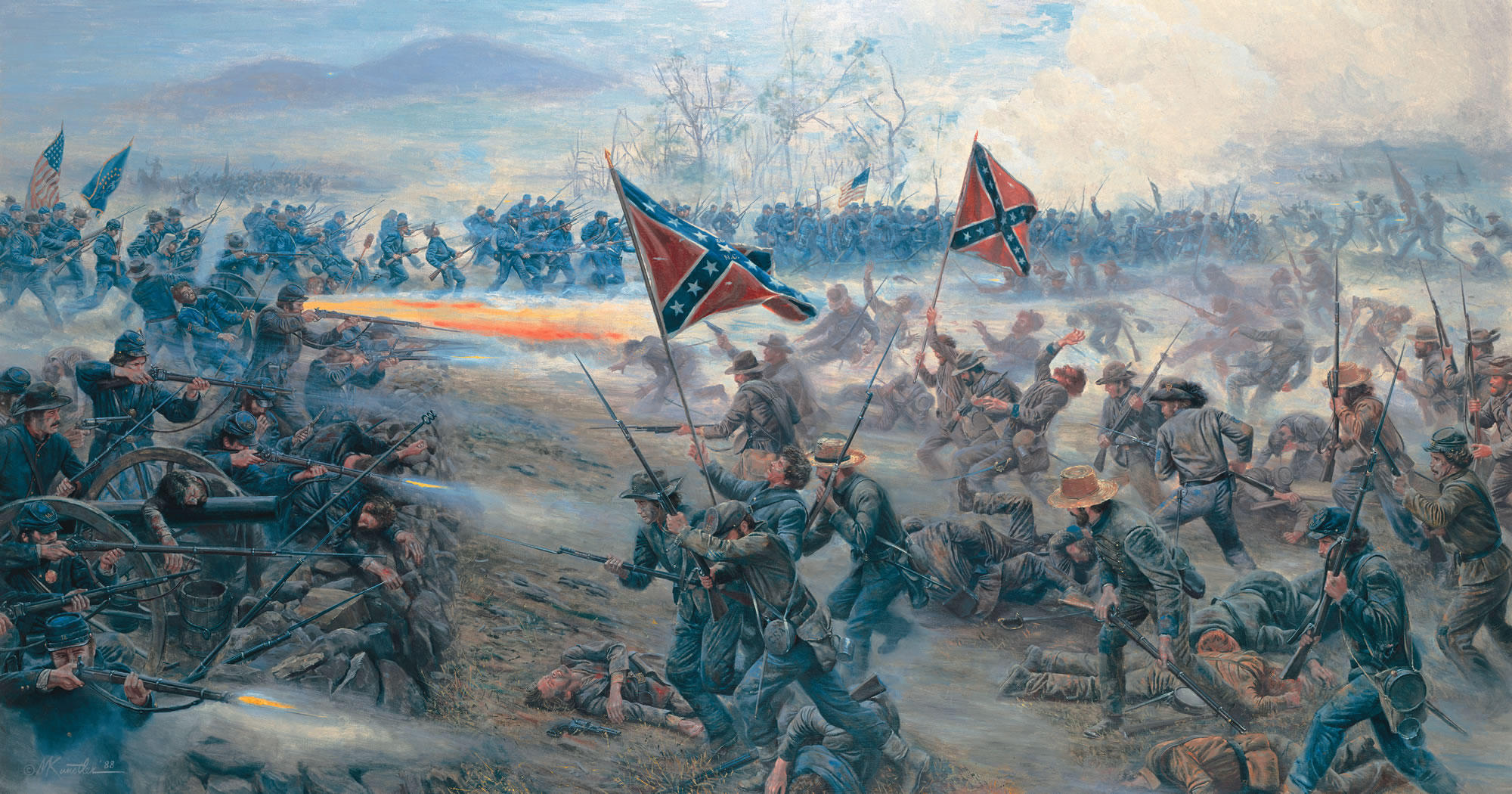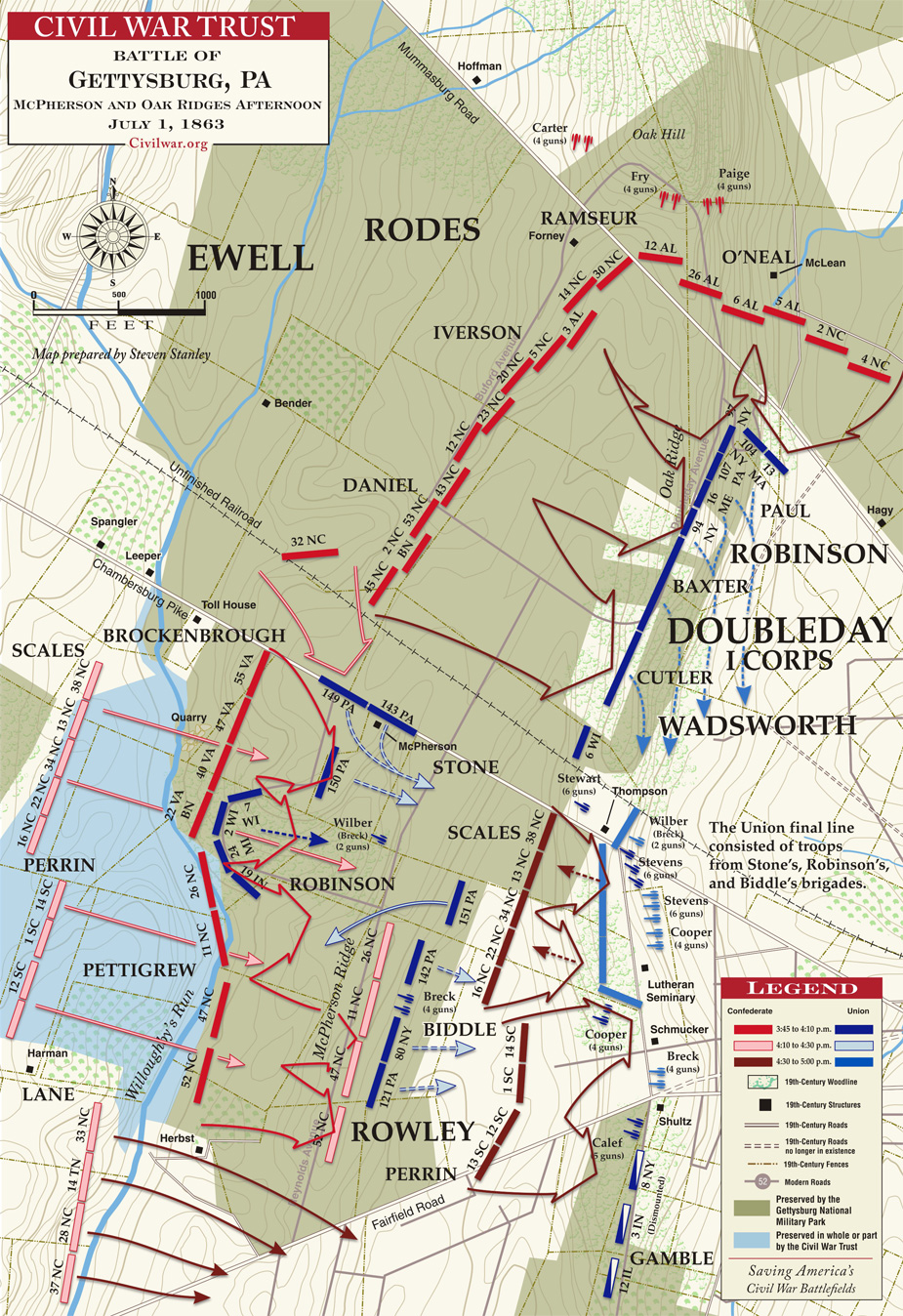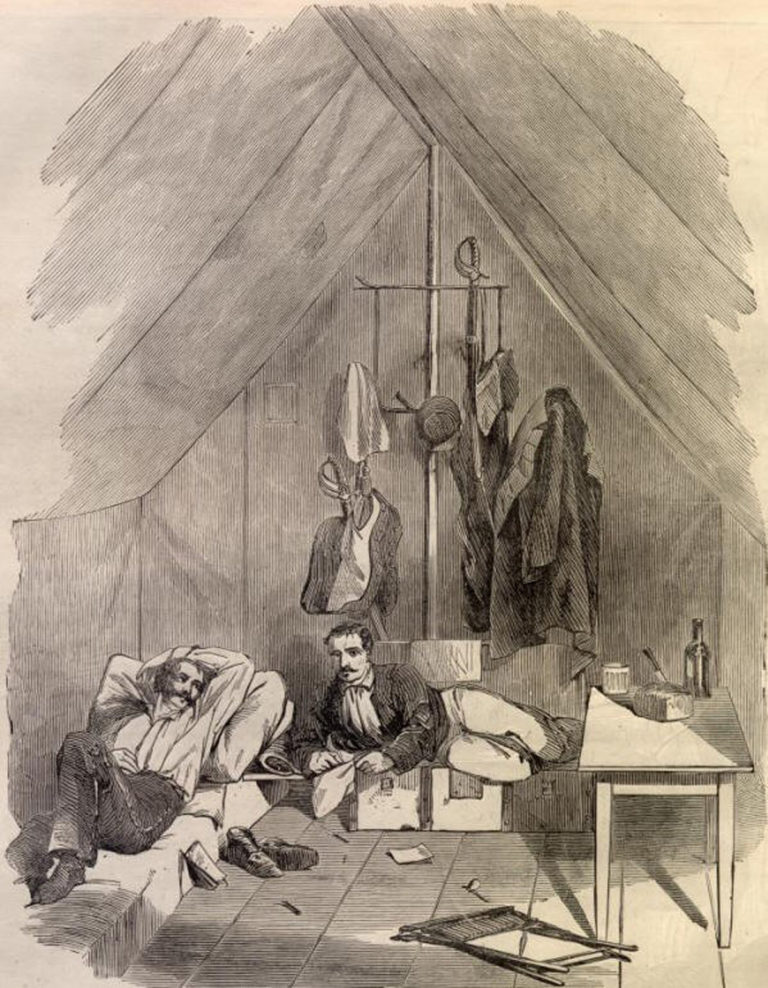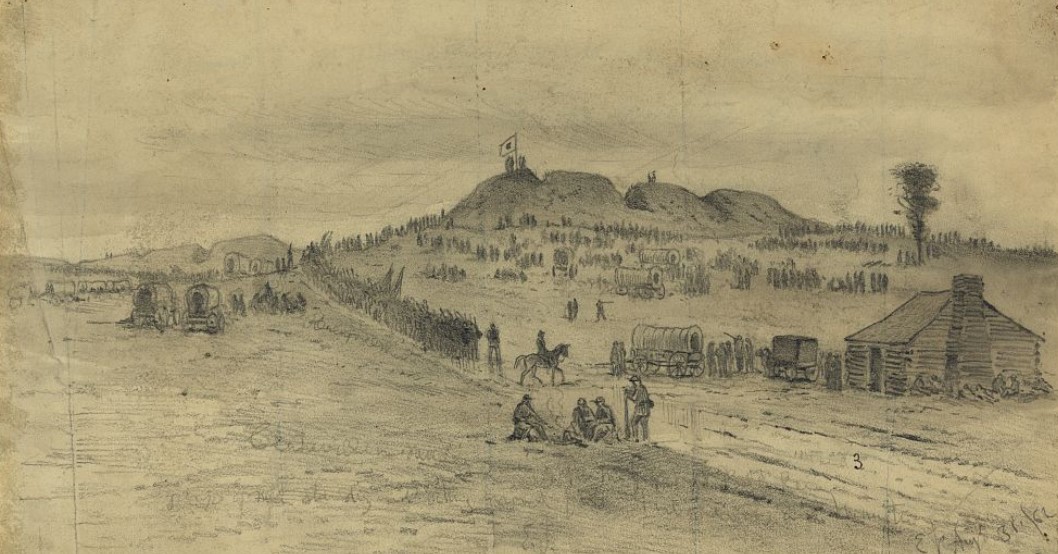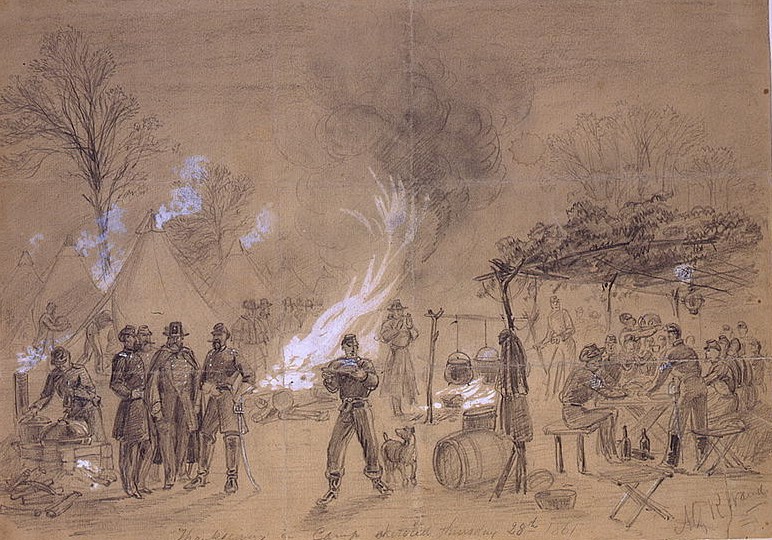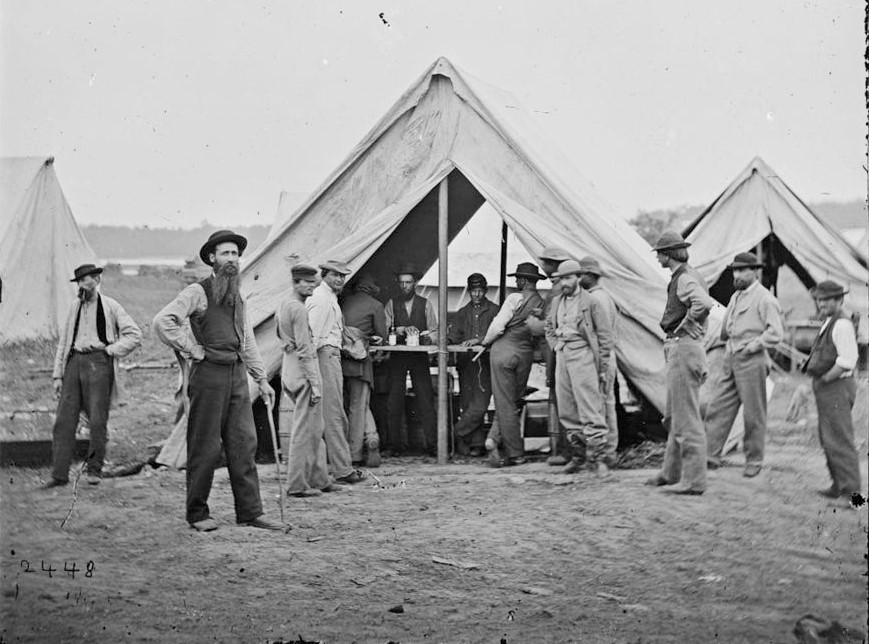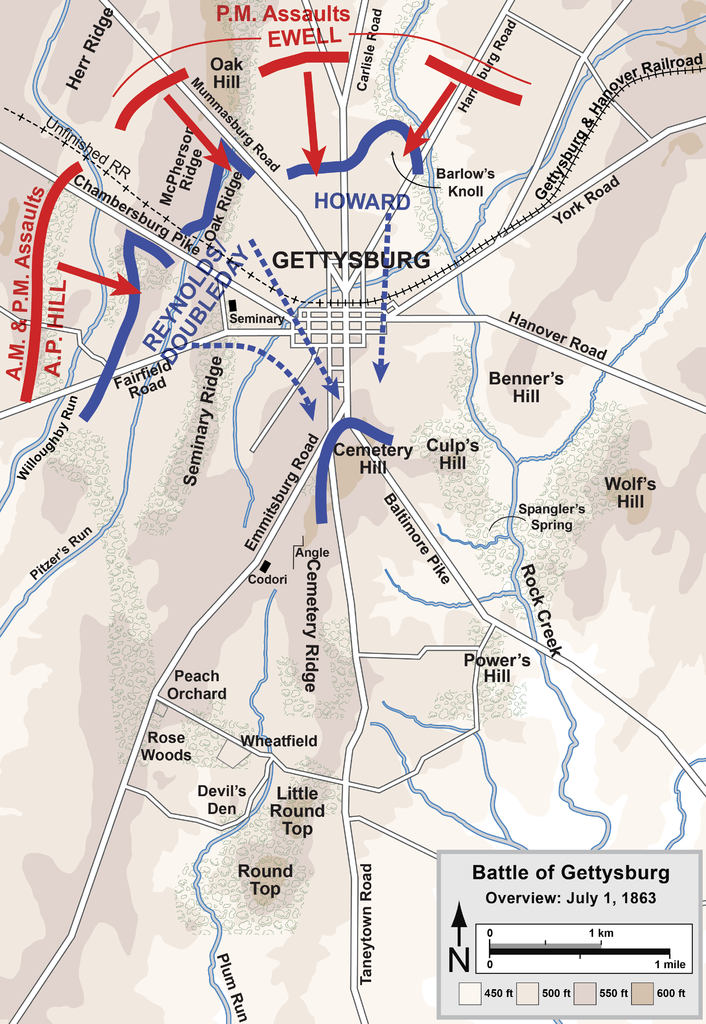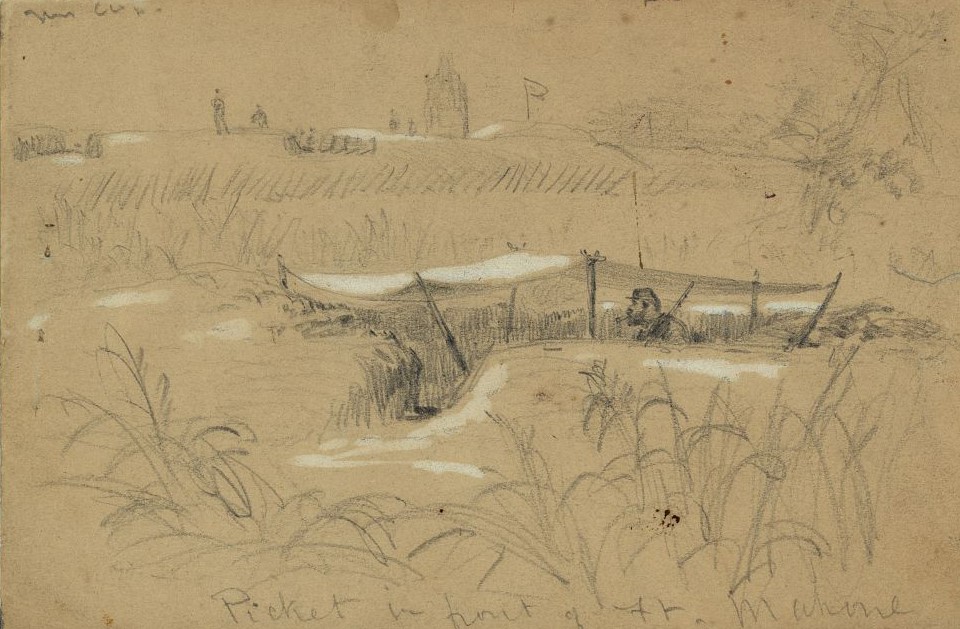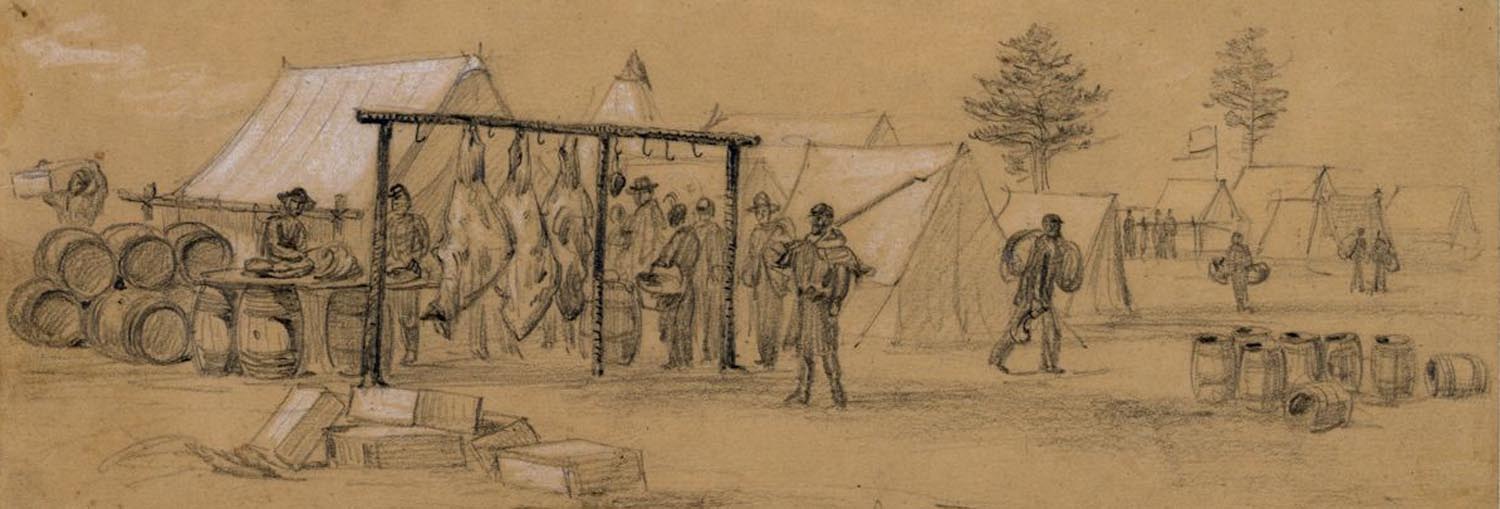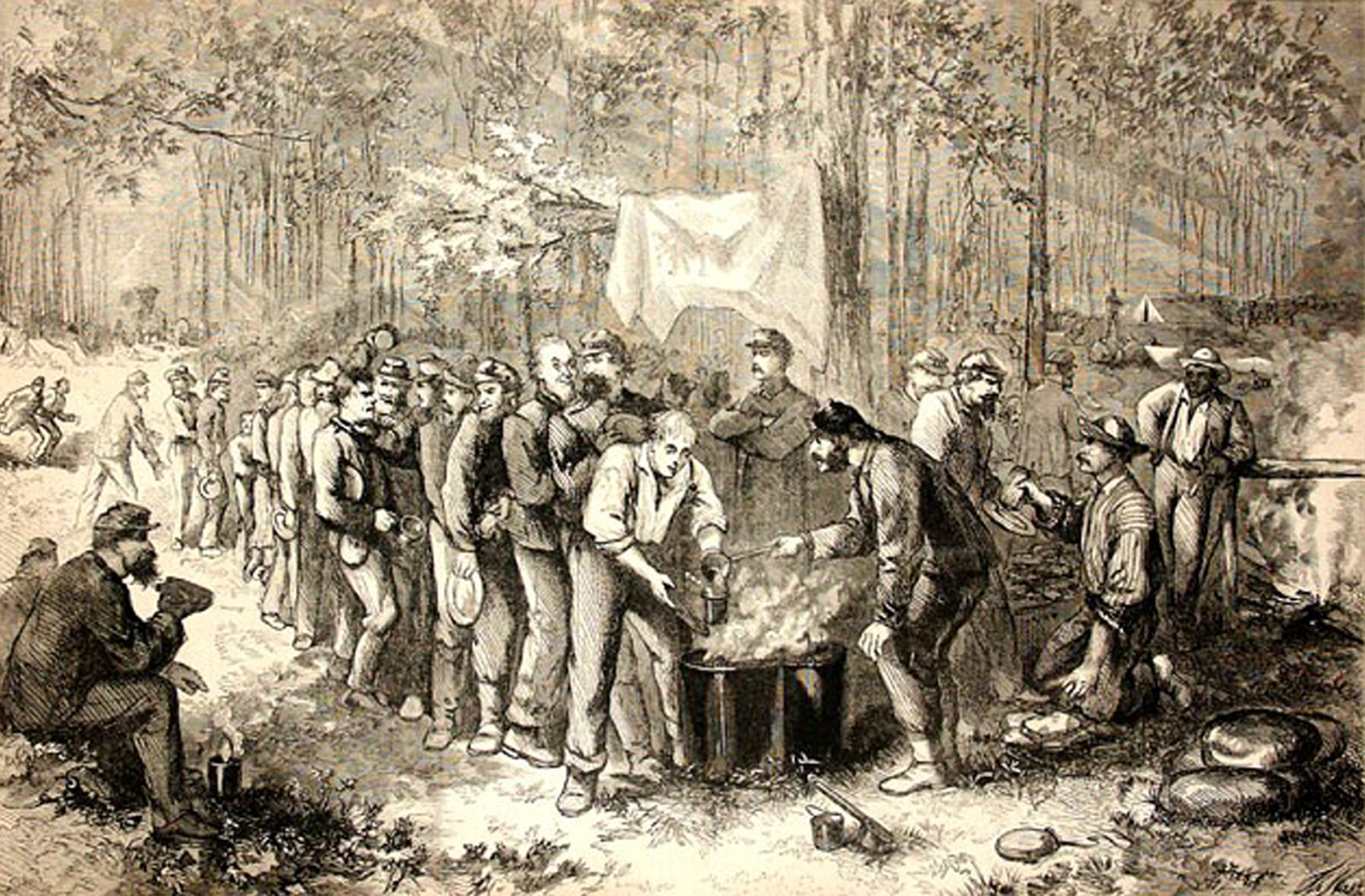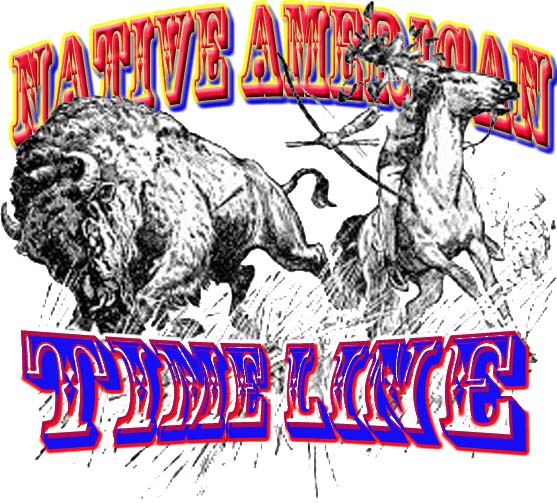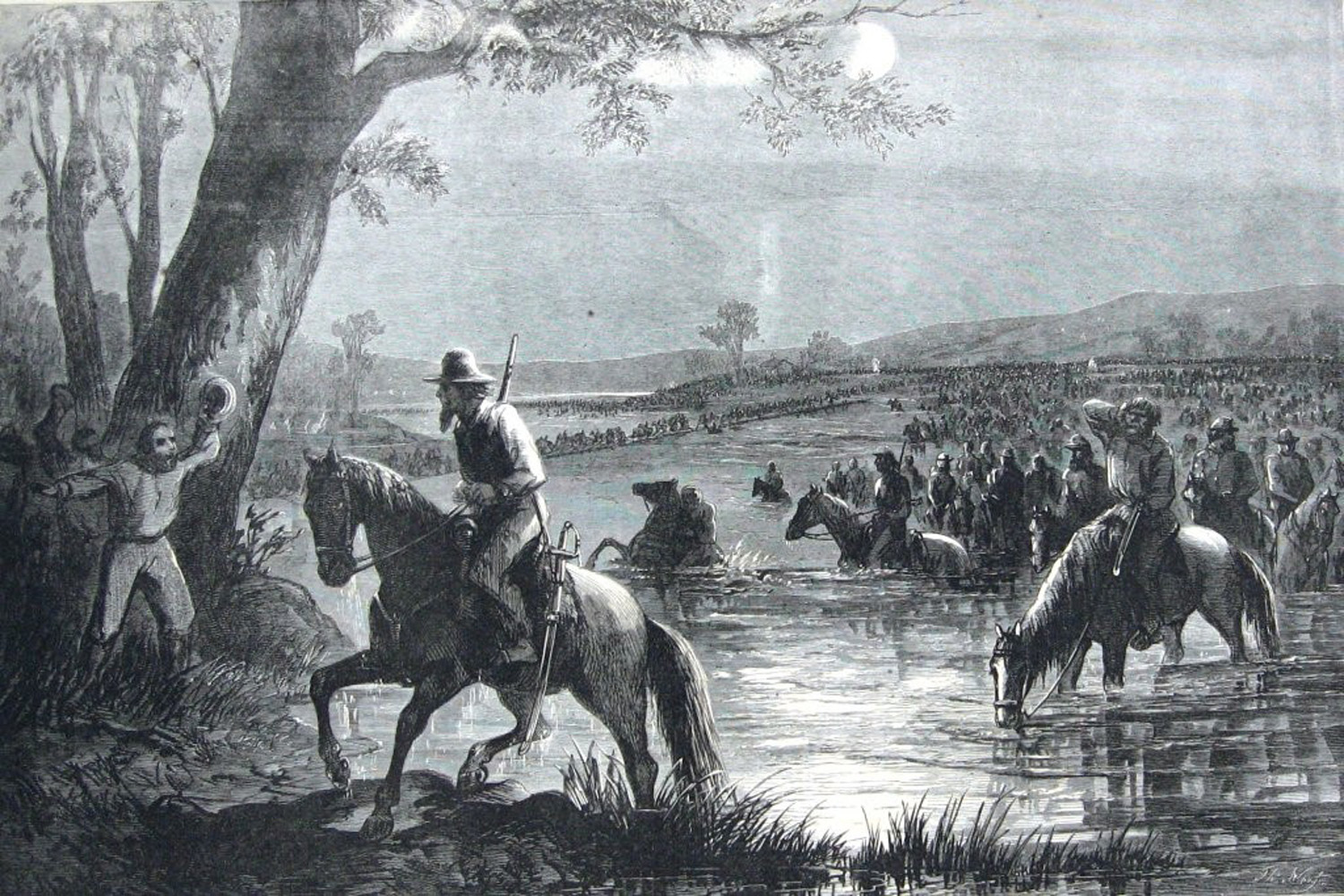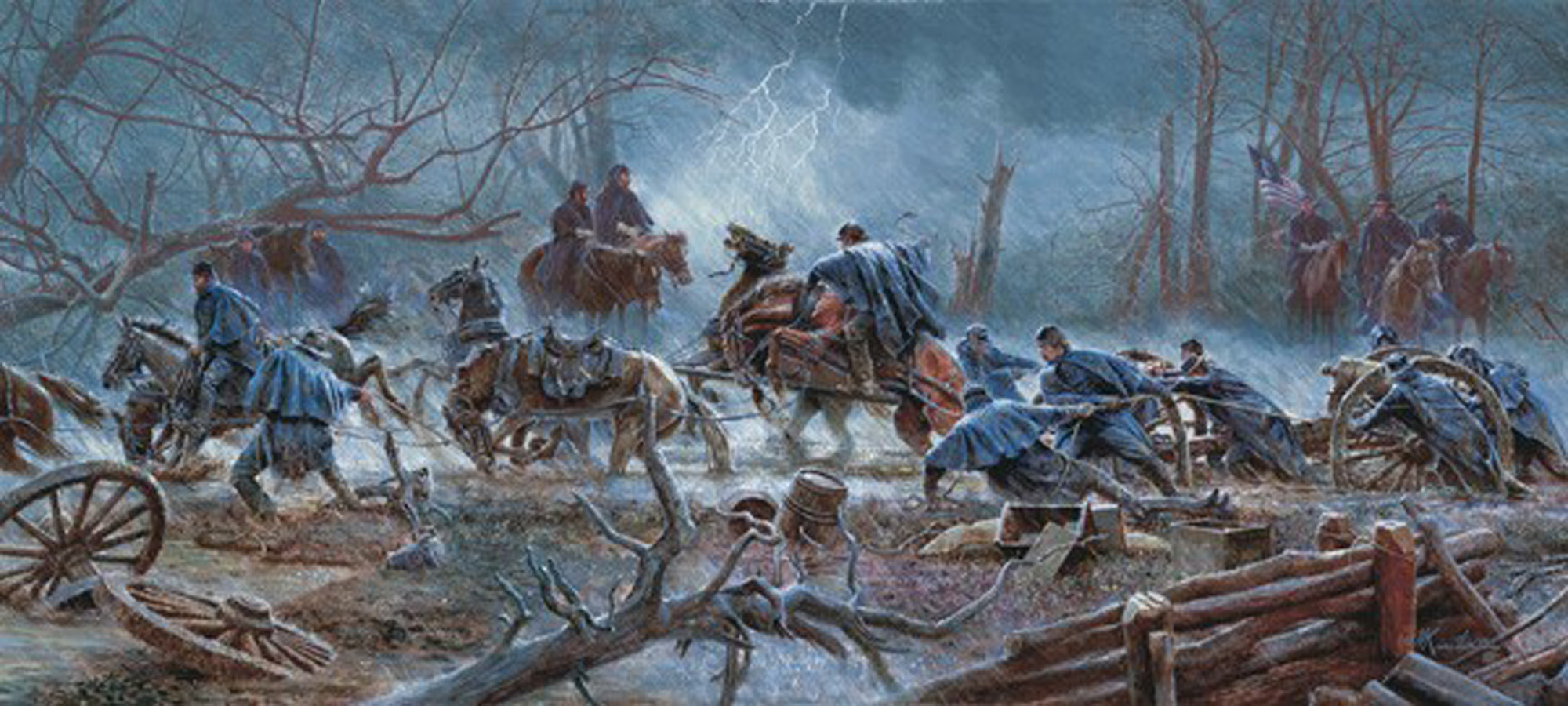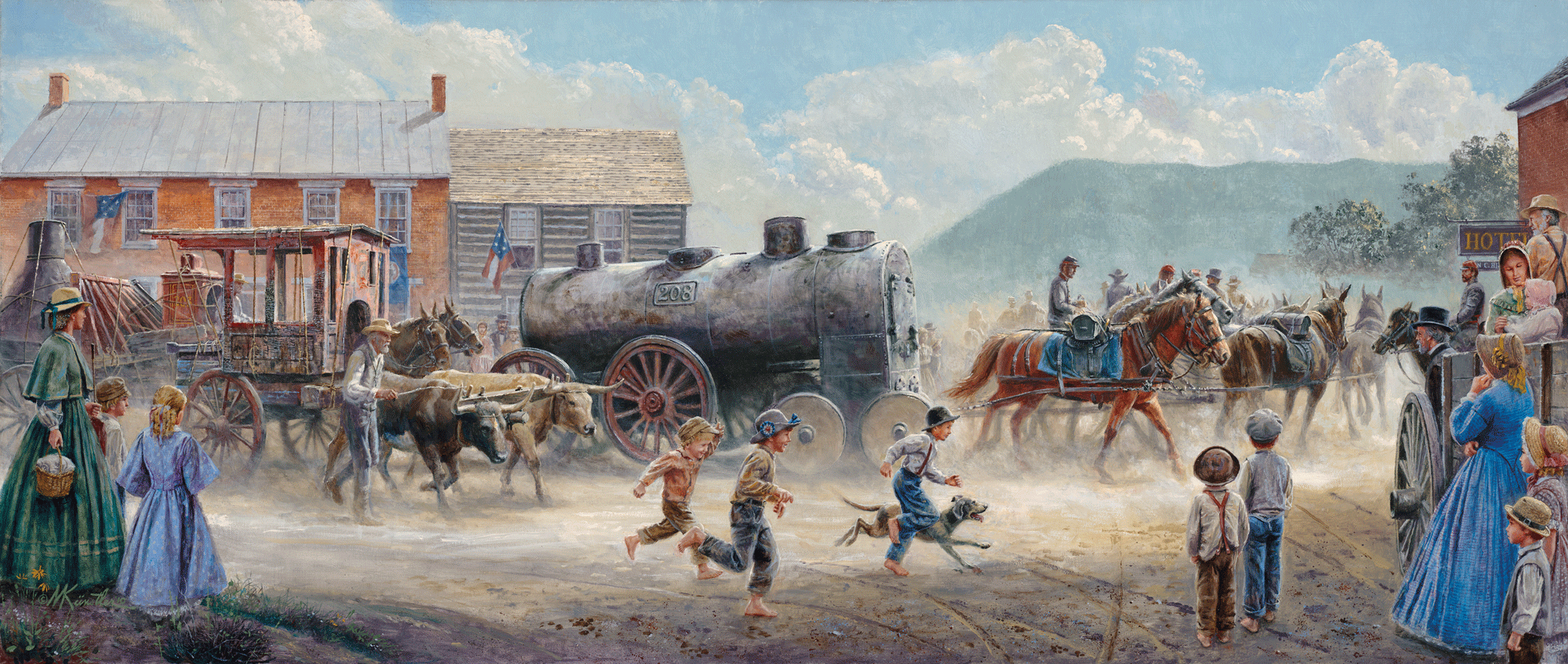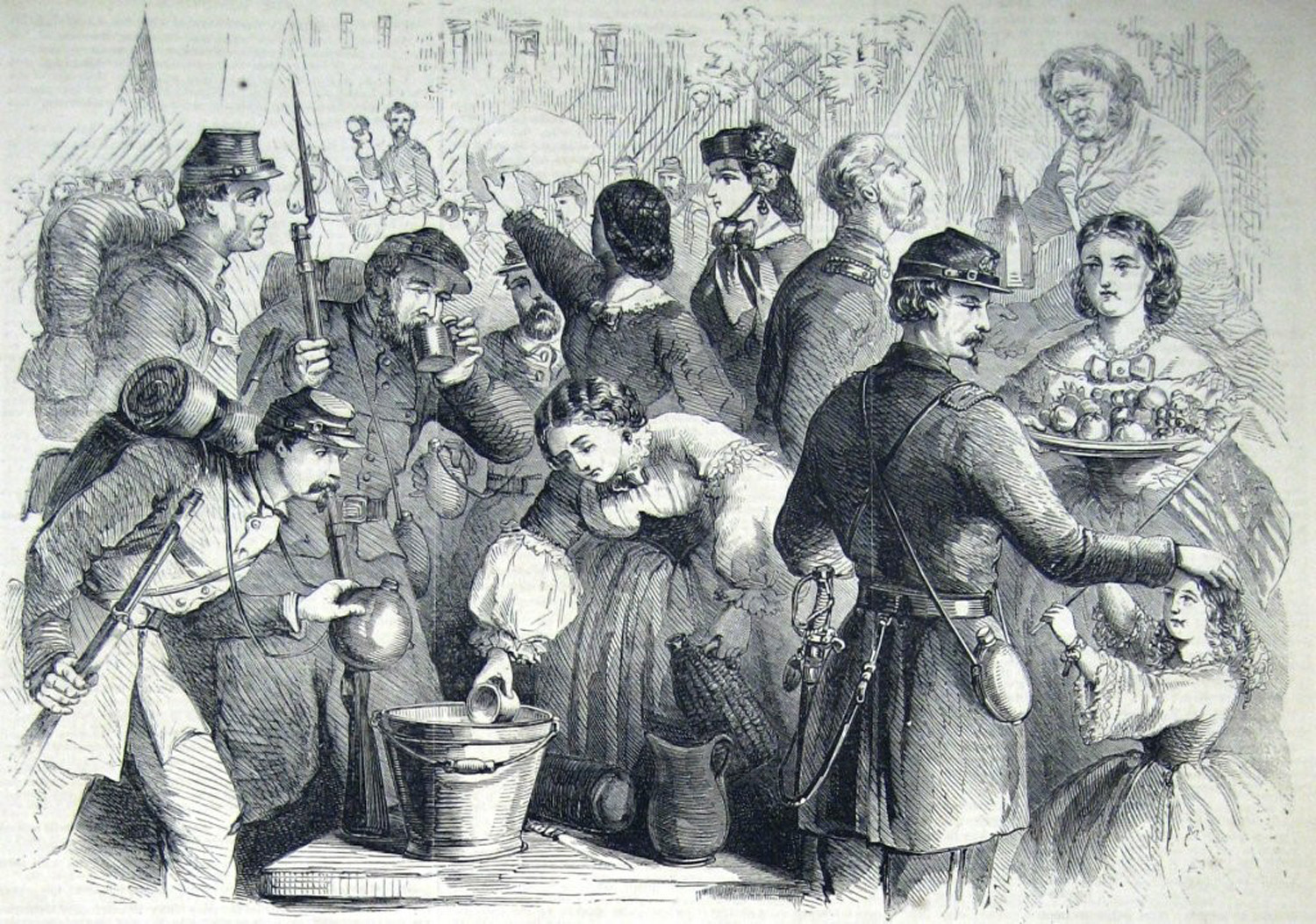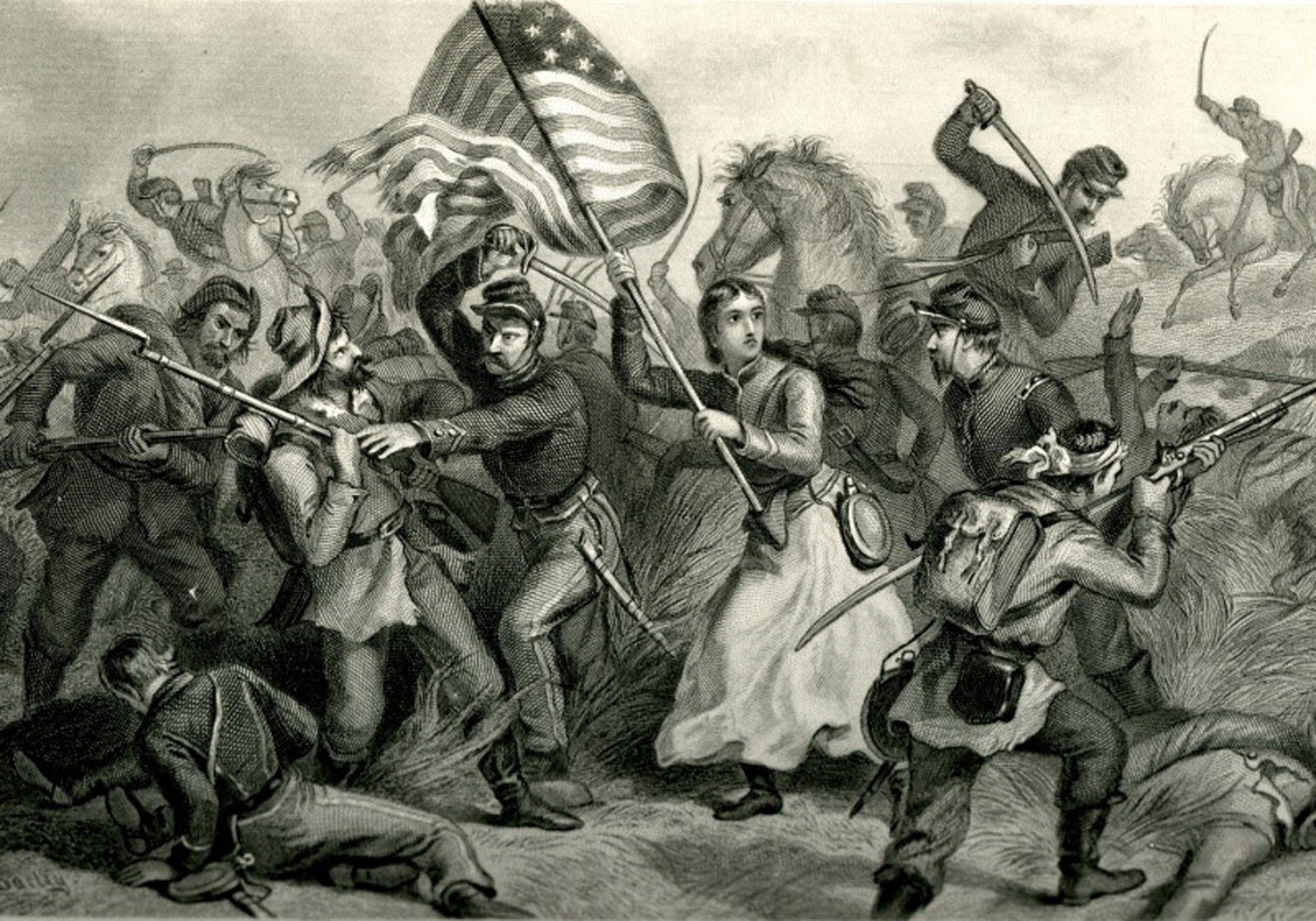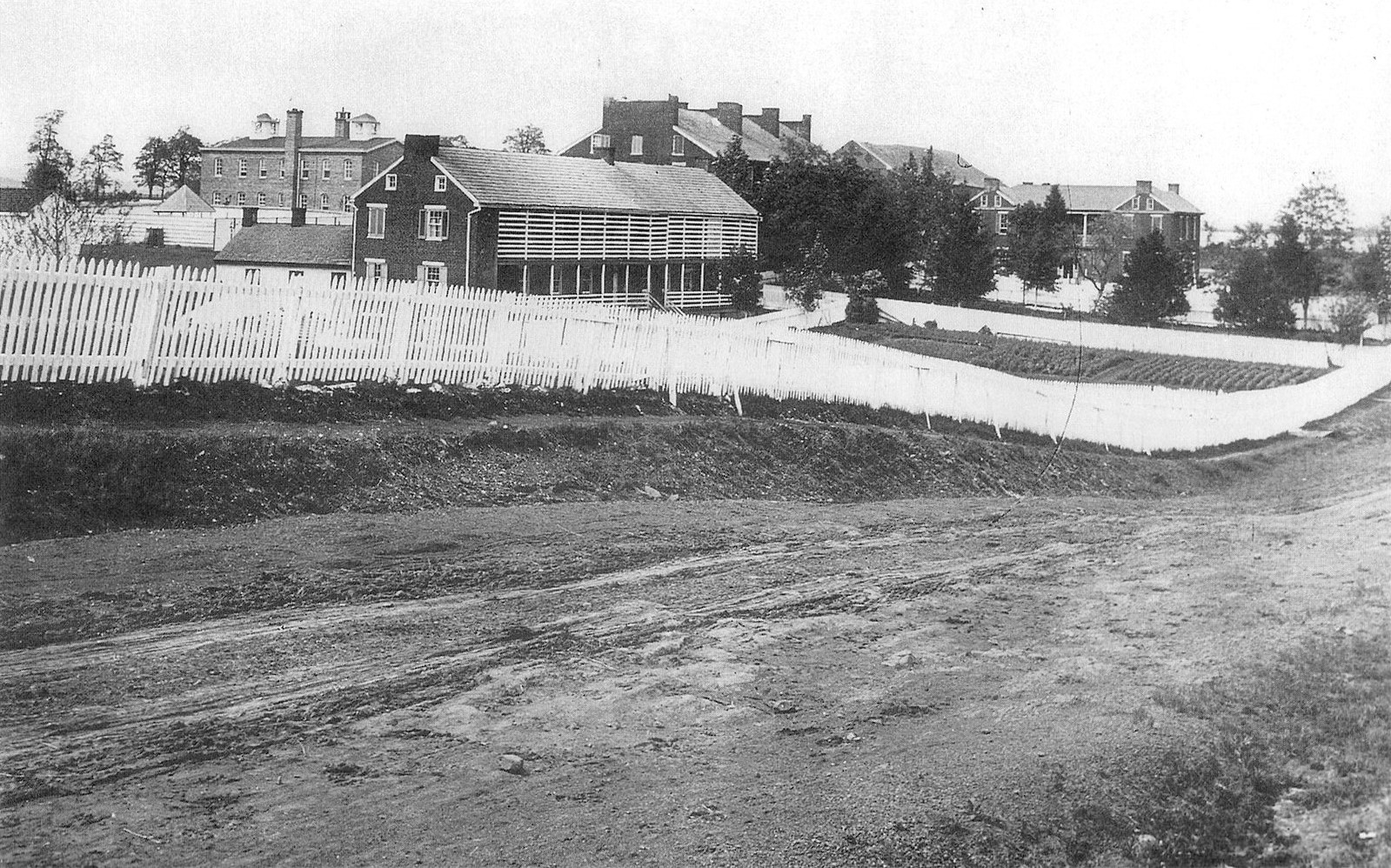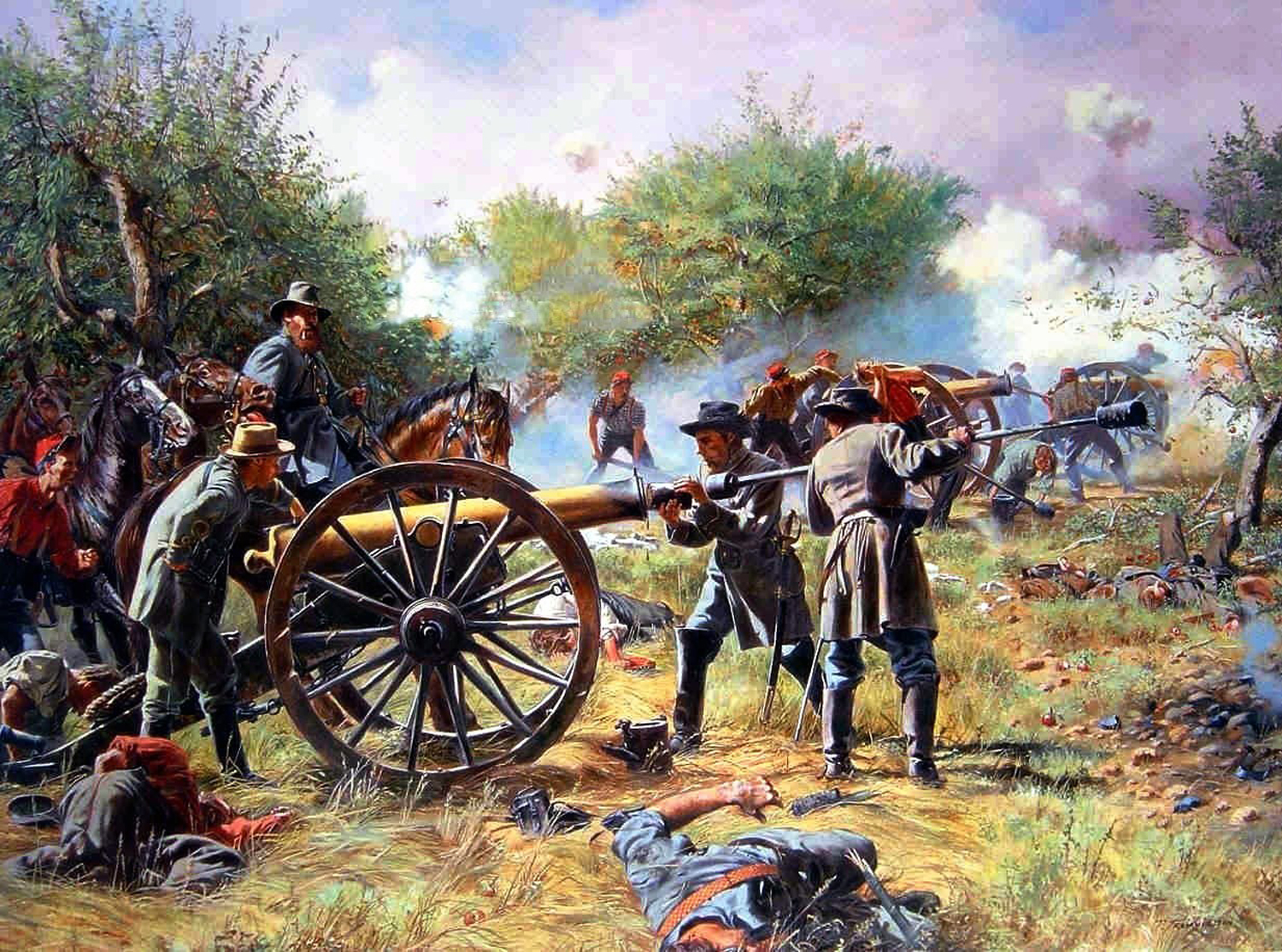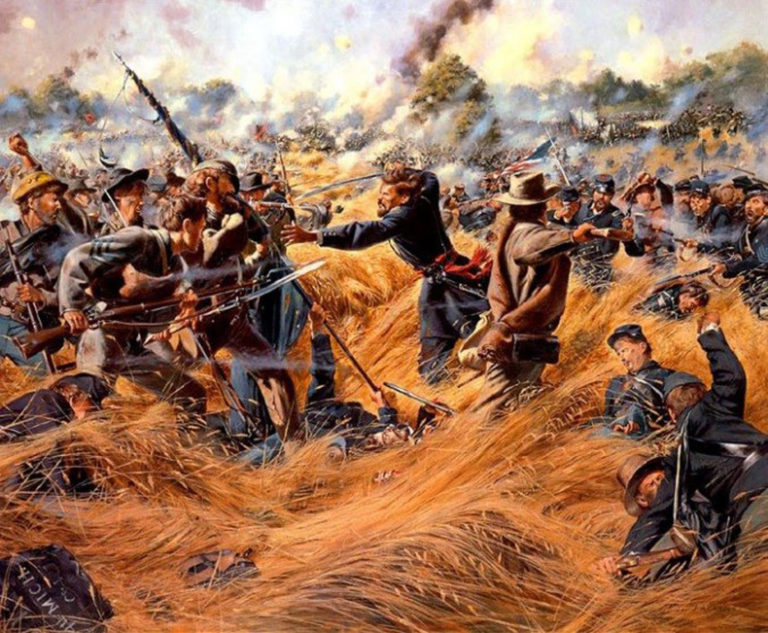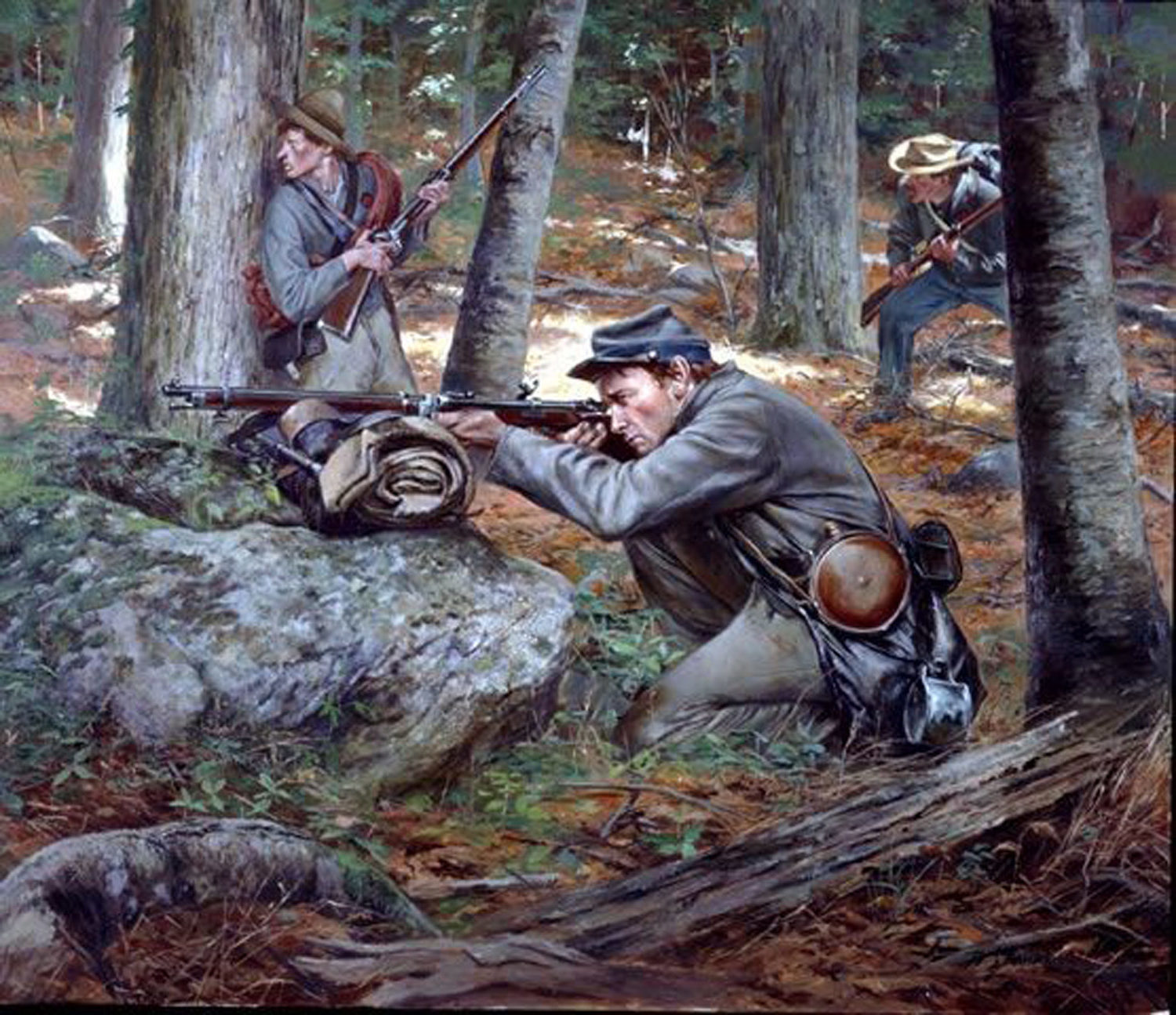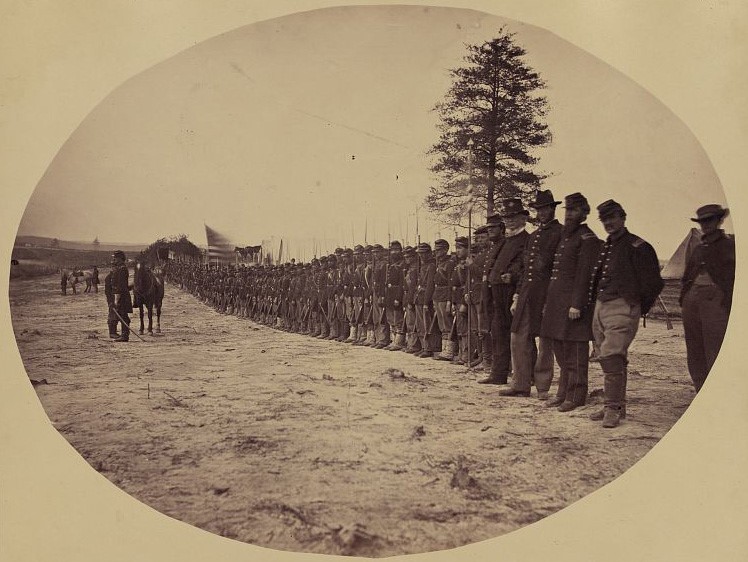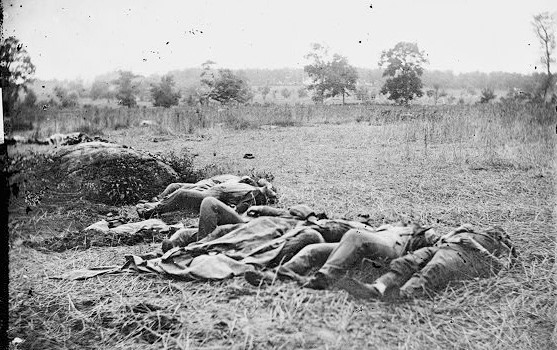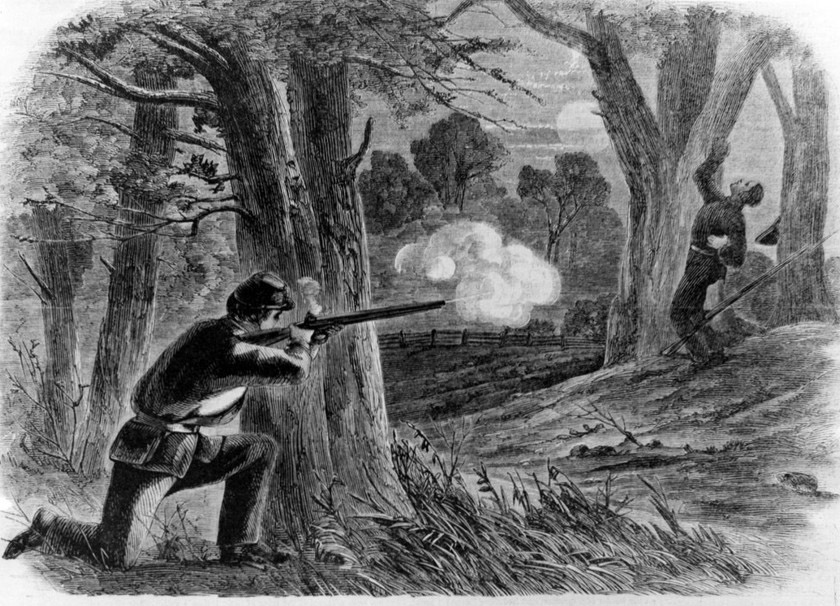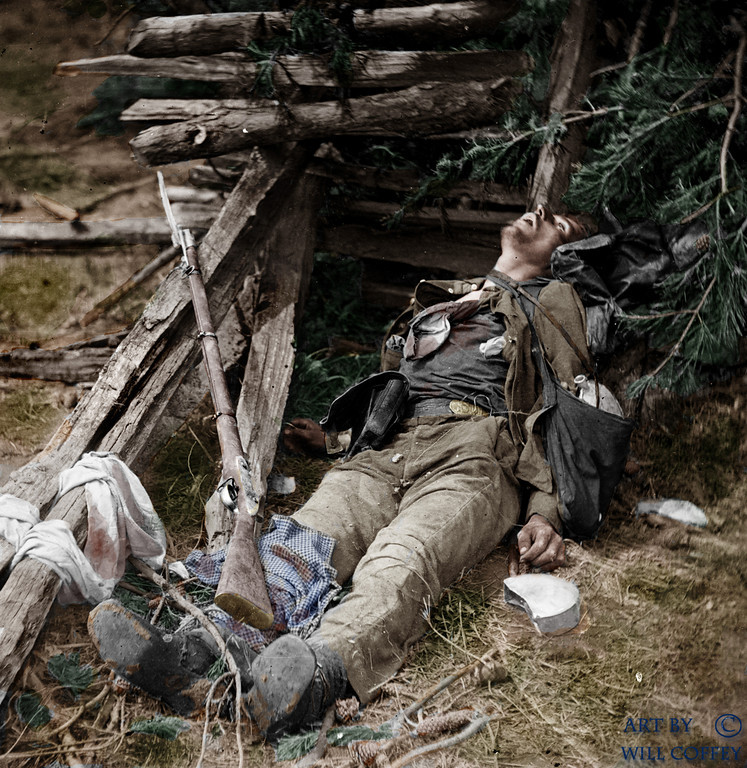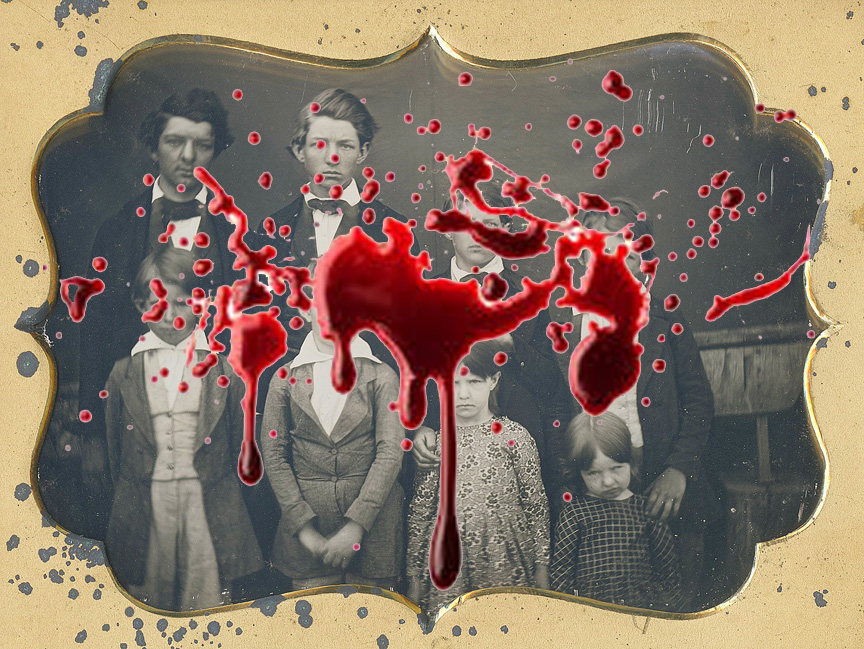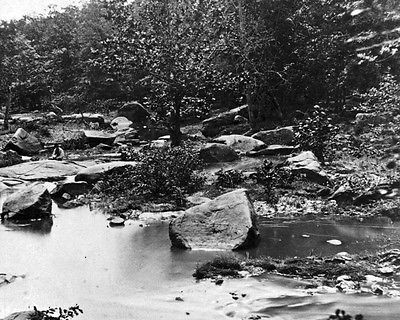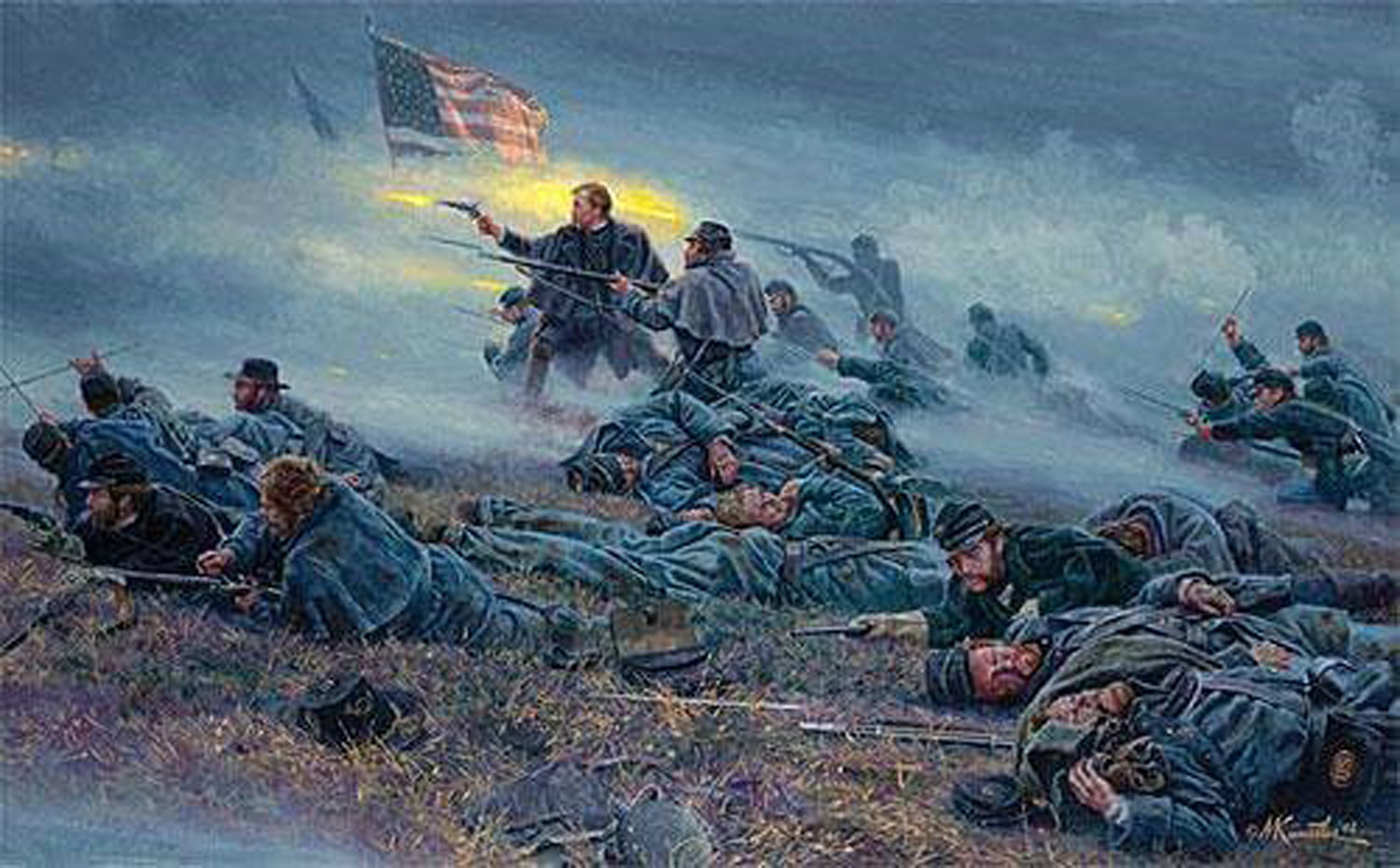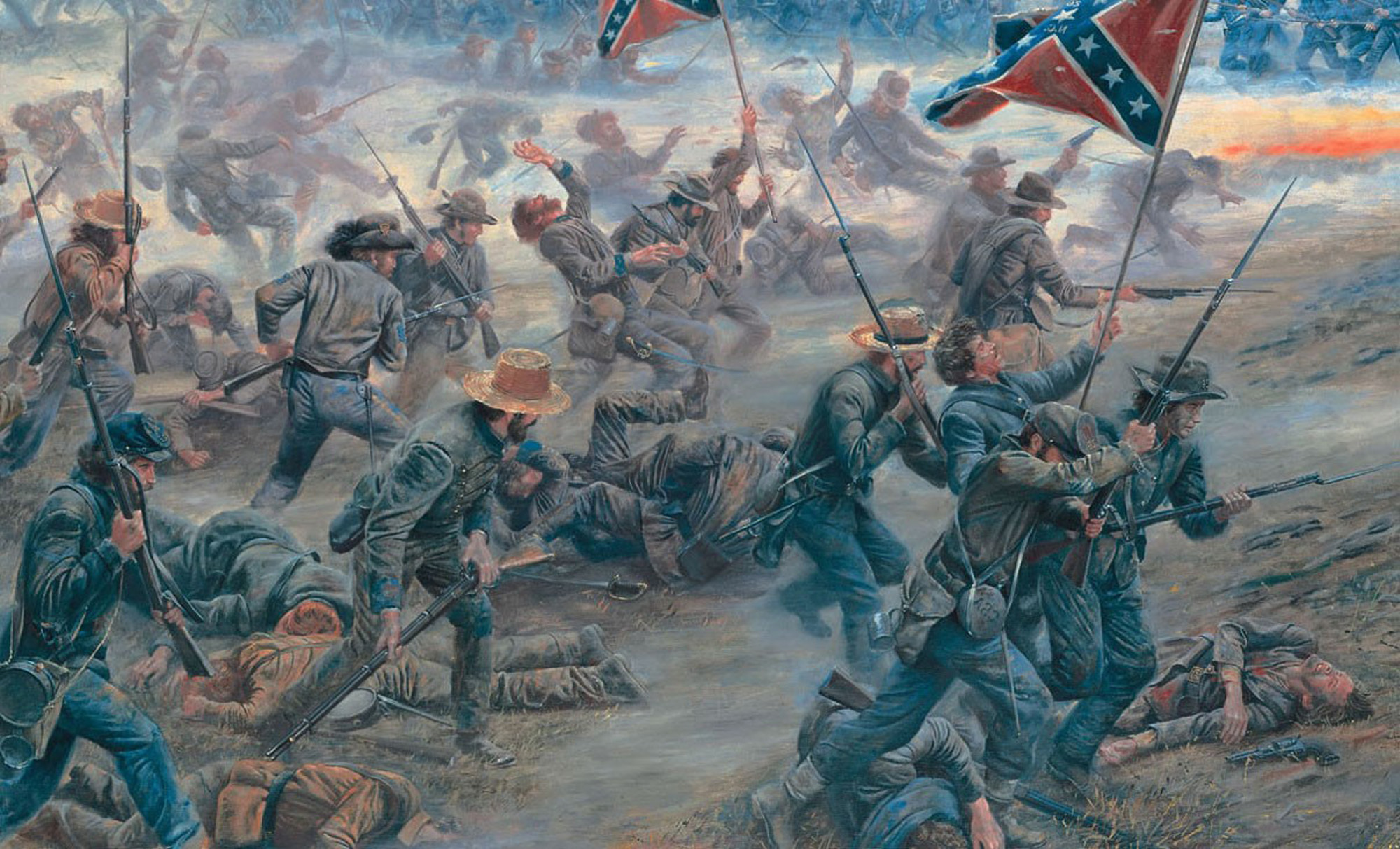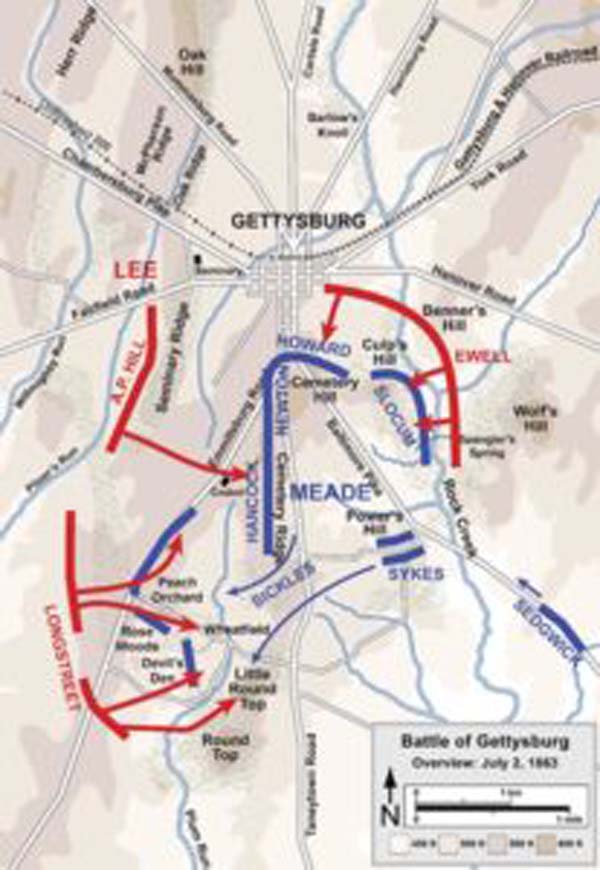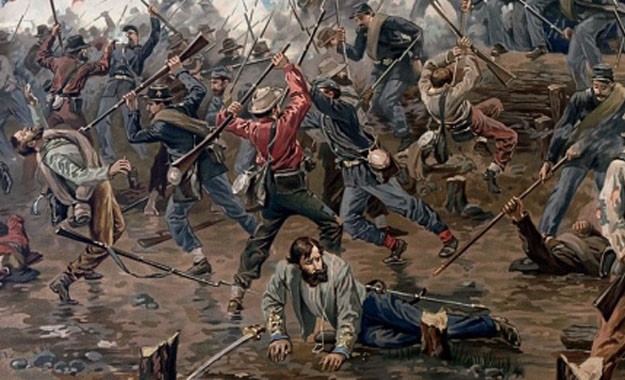The Battle of Gettysburg, fought from July 1 to July 3, 1863,
The order came to “Break camp,” and the troops relocated about two miles down the road to another.
Timeline 1844 – 1866
The camp was moved for the benefit of their health more than for anything else. This short march seemed to David about ten miles long. He was very near the end of his strength when they went into the new camp. Here David and Chunky put up a comfortable tent. They arranged it so that they could roll up the sides during the day, which made it nice and cool.
Life in a tent is either too hot or too cold
But they did not enjoy their tent very long. The men had a good deal of excitement, being called out almost every night. It was either a tramp to the picket line or forming the line of battle before daylight.
Then the orders came, “Everyone carries four days’ rations and one hundred rounds of ammunition in the cartridge-box and your haversack.”
Army on the move
David said to himself, “We always have ammunition in abundance even if the rations were a little short at times.”
The orders made all the men a little uneasy. During the short time they spent in camp, they could hear heavy cannonading every evening in the direction of Gettysburg. They all knew there was going to be trouble somewhere before long.
Camp life
Under these circumstances, many of the men might have been thinking about the next world. But David had not yet gotten through with this one. Due to the short rations, right now, his mind got to running on a plan on how to clean out the Sutler’s tent before leaving the camp. A Sutler or victualer was a civilian merchant who sold provisions to an army in the field or camp. Sutlers sold wares from the back of a wagon or a temporary tent, traveling with a command or to remote military outposts.
The men had a plan. It was after dark; this mission took place. But to their surprise, the old fellow was on guard all night and kept his lamps burning. David thought that he had gotten wind of their intentions. This being the last night that they remained in the camp, the Sutler was not cleaned out of stock as he should have been. But David thought, “I think I am square with him, for I still owe him a bill of five dollars.”
A Sutler’s tent
Still fighting hunger, the men returned to their camp, and David and Chunky settled in for the night. Everyone had a little trouble sleeping that night, thinking about what would come the next day. This night David had the second watch on picket duty. But before falling asleep, the haversack was opened, and the scarf-wrapped bundle was taken out. David lit a small white candle he got from the Sutler’s tent and started to write.
1st of July 1863
It is the night before the battle, and 1 shake at the thought of picket duty. But all is fair in love or war. Little 1 dreamed of the terrible slaughter that would take place on the morrow; and little did we think of the many that would be called to death before we should see another night.
Gettysburg first day of the battle July 1, 1863
I was ordered out with part of my company and some of company F men on the picket line. Orders were to fire on any one, or force appearing in front, and not to demand the giving of the countersign. It was a murky, misty night, and not liking the looks of what I thought was suspicious in front of my line, I told the boys I would scout out in front to see if there were any johnnies there, and that on my return I would be whistling “Yankee doodle” softly so they would know who it was.
But when half way back, the firing commenced on the left of the line, and hearing the rush coming through the cornfield, and thinking it was cavalry, and knowing my men would also commence firing to prevent a break through, I admit, candidly, that I forgot all about my whistling “Yankee Doodle,” and got back into line far quicker than when I went out. The laugh was on us when day light came, as the numerous dead in our front was seen to be not rebels, but innocent sheep, which would not even bite a union soldier.
On picket duty
Rations had been issued during the night at the regimental headquarters. Having hurried forward to join the regiment, those men who had been on picket went through that battle with what little they could beg from others. Let it be stated here that with but one single exception, there was no complaint made about it whatsoever. And that man was quickly silenced. Jackson Stein was a Company cook, and he was promoted to Brigade cook. He was dubbed “Stonewall Jackson” because the men said, “You could build a stone wall out of his sourdough biscuits.”
Camp commissary
He got the mules through the mud by using strong arguments and throwing his left-over biscuits at them. The medical donkey was wounded, and he destroyed it. The men had meat to eat, and no one mentioned where it came from. From then on, the medical supplies had to be carried by the men now to keep them from falling into the enemy’s hands. During a rest stop, David continued writing.
Feeding the troops
Timeline 1860 – 1864
No date:
Reveille was not heard early. . . .after breakfast which I think was between six and seven o’clock, quite a little after we heard ‘officers call’—the officers came back and ordered us to clean up our guns as we might expect a skirmish before night. We all laughed at the idea of finding rebels in Maryland and Pennsylvania. 1 think there was not one of us who believe that there was a rebel on northern soil, at least 1 do not, nor do 1 care. We cleaned up our guns; that is swabbed them out, and saw that they were dry on the inside, and in good trim for active service. We had rain the night before, and it was a cloudy, close morning. The next order we got was to pack up; just after that we all fell into line, when our captain came along the line and was shaking every one by the hand and giving us good-bye. Poor fellow I think he was better informed than we were, for the tears were rolling down over his cheeks…
General Lee invades Maryland – Confederates crossing the Potomac
The next thing the soldiers heard was cannonading, but it sounded to them as if it were twenty-five miles away. One among them shouted, “Boys, there’s ain’t no use us marching so fast, for we will be dead long before we can get there.” But the cannonading was getting plainer, and David could hear the reports better.
Confederate artillery
The trot was very nearly a double-quick for eight miles until they arrived just outside of Gettysburg. But something was missing. Bates and the Eleventh Corps were supposed to already be there, but they were tardy. Many of the soldiers that fought that day remarked later that if Bates had been in the ranks with them, the outcome would have been better. The troops had hard marching before in this campaign, but this was the worst. The roads were muddy, and when they got in the town of Gettysburg, the mud must have been four inches deep.
The mud march
The fight had already commenced west of the town when the 153rd entered Gettysburg from the Emmitsburg Pike. Along this pike, they met a thousand or more citizens fleeing from their homes as from ‘the wrath to come.’ As the troops entered Gettysburg, David noticed the town was deserted except for a few well dress ladies. David made an entry in his diary later about their kindness.
Citizens fleeing
July 1, 1883:
I will not forget the ladies of the town. They stood along the sidewalks with buckets of water, and doing all they could for the men. God bless them. Chunky and our band played as we entered the town. He tipped his hat to me as they performed. Cannon were booming, and musketry rattling, while wounded were being brought back through the town. By all appearances the hell was on.
Ladies of the town
The men in small groups advanced up the street from the Pike toward the town square. Standing near the middle of the street, amid all the bursting of shells, was a young girl. She was handing out water in a tin dipper. She was taking it from a tub in which her father, a man of about fifty, kept filling with buckets carried from his house nearby. These were the last two civilians in sight.
It is not difficult to imagine what an attraction this spot was for the soldiers, especially for the younger ones. The young bucks were as eager for the sight of a pretty girl as for the refreshing water, and she dipped with almost provoking impartiality. She wore a white dress and an apron with a bib representing the stars and stripes. This was a style much worn by patriotic ladies at the time. Then David, in his due turn, got a drink from the dipper lifted by those brave young hands.
He said to the girl, “This is no place for you.”
The young lady smiled and tried to be heard above the shelling as she answered him, “Oh, it’s all right, I think,” was her reply.
‘She was very brave, and she gave us great cheer.’
After the war, in his magnificent speech at Nazareth in May 1909, General Howard related an incident of a girl who waved a flag to the soldiers and gave out freshwater in the streets of Gettysburg where the bullets and shells were flying thick. He must have referred to the same girl.
There can, at any rate, be no more fitting tribute to this girl’s memory than the words of General Howard, “She was very brave, and she gave us great cheer.” As soon as they got clear of the town, they received another reception. But this was in the shape of solid shot, shells, and everything that could be shot out of a cannon. The officers tried to calm the men while shouting the command, “Forward double-quick men,” as they led them toward the big red barn of the Almshouse.
Almshouse complex with cribbing on the 2nd floor porches
The Almshouse was a house built originally by a charitable person or organization for poor people to live in. The community donated money or services to support the poor and indigent. At a later date, David made a note about it.
No date:
The shells were coming pretty thick as we made our way towards a big red barn. Some were going over us, and some did not quite reach us. A shell exploded right over the column, and every man dodged for the instant. We had a little fellow in the company who threw himself on the grass, and while I was looking at him and laughing, and not paying attention to my feet, the foot on the game leg struck a big stone and I fell stretching about a rod before I got down. The ranks opened and allowed me all the room I needed, and I have no doubt they thought I was the first man killed. When I got on my feet again I was alongside of captain Howell of company D, and as our guns were not loaded, I proceeded to load mine, when the captain gave the command to load and it passed along the column.
Confederate artillery
All the soldiers got to the barn without the loss of a man. There they formed the battalion in mass, and the Major addressed the regiment. “Men, we were a nine-month regiment, and our time has expired on the 22d of June”.
The Major told the men their time was up, and if there was a man in the ranks who did not wish to go into battle, he should step out. Then he went on to say, “It is no disgrace but that the enemy is in our native state and that the people of Pennsylvania look to us for relief. And that it is our duty to protect our homes”.
But before his speech was ended, an order came for two companies for the skirmish line. Companies A and B were detailed, then the Major concluded his address. The men gave three cheers, and not a man stepped out of the ranks. The bugle sounded the advance, and David followed the skirmish line by the battalion in mass.
Battle in the wheat field
All but eight companies of the regiment were forming the skirmish line. To the left of them was a wheat field full of Rebel sharpshooters, and the woods in front were likewise full of them.
Rebel sharpshooters
While they were advancing, General von Gilsa took his position in the rear of the skirmish line about fifty yards in advance of David. He could hear him giving orders to the skirmishers.
The General shouted, “Do not shoot unless you see something to shoot at. Ammunition is money, so do not waste it.”
The skirmish line
Just at this time, the bullets commenced to whistle, and some of the boys on the skirmish line were trying to dodge them. The general told the boys, “Never mind those that whistle, as long as they are not whistling Dixie, you are all right.”
The skirmishers cleaned the rebels out of the wheat field in short order. David and his men followed up the skirmishers to clear out the woods, and there they deployed right and left in the battle line.
Confederate soldiers killed near the wheat-field at Gettysburg
They advanced about five rods into the woods, where they got into position. Then, more side-steps to the right to stretch the men out and cover more ground until the line was not any more than one. The woods were so thick and the men so far apart, it was hard to see the next man on either side.
Off to his left, David heard the familiar snap of dry brush breaking. He could tell by the sound it was not a small animal approaching, but it was the footsteps of a man. The light through the threes cast little shadows moving around as if everything was alive. It was tough to tell the real from the imagination.
“There!” David listened hard and thought he heard it again, then he did.
He had learned while deer hunting, if you hear something moving in the woods, stand still and don’t move. There was a slight chill in the air, and David could see his breath and wondered if anybody else could. He slowly turned his eyes, then his head towards the sound. Something was moving through the woods, and it was a Confederate soldier. He must have just noticed David because he turned and fired directly at him.
A shot in the woods
David immediately returned fire, and he saw the Rebel drop his gun and fall backward to the ground. Both soldiers understood that this was a war to the death. And there was no room in this war for either hesitation or pity before pulling the trigger. The shots echoed throughout the woods, and just as quick, it became deathly quiet again.
David had shot at the enemy many times before, but this was different. He had seen men die before, even his close friends, but this was different. He had witnessed the awful effect of artillery raining down death on many soldiers all at one time, but this was different. His heart was racing, and he broke out into a cold sweat. His mouth was so dry he could barely swallow or speak. His whole body felt like lead, and he could not move. What had he done? He was trained to fight and kill the enemy. The Rebels were killing his comrades all around him. David knew he had never felt this way before, and he also knew he never wanted to feel this way ever again.
The force of a mini ball or piece of shell striking any substantial portion of a person is astonishing. It comes like a blow from a sledgehammer, and the recipient finds himself sprawling on the ground before he is conscious of being hit. Then he feels about for the wound, the benumbing blow deadening sensation for a few moments. Unless struck in the head or about the heart, men mortally wounded live some time, often in great pain, and toss about upon the ground.
Now David found himself slowly walking towards his kill. He was no longer concerned about being quiet or careful as he advanced directly to the very spot where the man lay. One shot was all it took, and the man was dead. But David was not proud of his marksmanship or with his kill shot.
The kill
He remembered when you are deer hunting, it was always best to have a good kill shot to the heart to bring the animal down immediately so they do not suffer. But he could see from the expression still on the man’s face that he did suffer greatly. The young soldier’s last efforts had been to tear apart his clothing to see how bad he was wounded.
David threw down his gun and got sick. He felt too hot and almost passed out right there on top of the dead soldier. It took several minutes and a few deep breaths before he got his battle wits back together. Then he realized that he was not in a safe place, and he had to get out of there right now after firing his weapon. Anyone around, friend or foe, would know exactly where he was, and they would be looking for him.
David looked back down at the soldier lying lifeless in front of him. He somewhat expected the dead man to rise up and keep on playing war like they did when he was young. But this game was real, hard to take, and impossible to win. Seeing what he could use from the dead man, he took it. Canteen, ammo, and he felt something like a book in the rebel’s vest pocked. Books were not always just for reading during the war. They had another critical use other than that, toilet paper. All the soldiers on both sides searched the bodies of the dead and took anything usable. David had done this too many times before.
This time he felt a little numb as he went through the motions, and then he found it. From the vest pocket of the dead Confederate soldier, he removed a small silver case. As he was looking at it, it popped open, revealing that it held a tintype picture. It was a small tintype like the ones that you could get from a vendor at a fair or on the street in town. David took a close look at the picture. It was of a group of young children. He reached into his shirt pocket and felt his tintype picture, but he did not need to pull it out and look at it. It was the same one. Then he knew the man lying at his feet was his cousin. Now he saw the scar on the right side of his face left there from the broken stick. He could see that the young boy, Chunky, and he used to play war with, had put on real soldiers’ clothes and become a man. Now he was a dead man. And David had killed him. When they were children playing war, he would just get up from playing dead. But not this time.
A familiar tintype
Two incoming rounds from two different directions hit the ground and the tree next to his cousin. The truth is, when bullets are whacking against tree trunks, the consuming passion in the breast of the average man is to get out of the way. David’s reaction was automatic, and he retreated from that ground immediately! He ran. And he ran.
As the low brush swatted him in the face, he kept running until one of his own men shouted, “If you are in a big hurry to get to the front, it’s in the opposite direction.”
Then David stopped, set down, still holding his weapon, he leaned upon it and cried. Then he abruptly got up and returned to his place in the woods on the line.
Rock creek
The skirmish line, when formed, ran through a small piece of timber with the ground sloping down toward Rock Creek. The underbrush was also dense. The battle line had been formed on the brow of a hill some three or four hundred feet behind David. The fact was soon ascertained that they were being fired on the front and right flank. Accidentally, they got into an angle of General John B. Gordon’s Corps and were receiving friendly fire. The shooting stopped when both sides began to sing the Battle Hymn of the Republic.
Union soldiers laying down under fire
The men were all tired or more dead than alive, and it did not take long for them to lie down.
As soon as they got down, a battery in the rear opened fire from higher ground than they were. The troops could feel the heat of the balls as they passed over. About this time, the Rebels made a charge away to the left of where the men were lying. The battery in the rear turned their guns on the advancing Rebel army. David turned his head away because he could not stand to watch the carnage of the cannon fire on those unfortunate men.
Confederate soldiers under heavy fire
David could see balls ploughing up the ground along the rear of the line. And he thought to himself, “If ever Johnnies ran for cover, those fellows did.”
Shortly after this, the Rebels made another charge near the center of the line but still to the left of David’s position. He told his nearest comrade, “I think it was a feint, their object being to keep us in our position until they got ready.”
As soon as they fell back, one of the boys near David said, “We will get a chance next.”
When the men enlisted, they all got a copy of the Army Field Manual. It says in the book that “a rod is about 5 ½ yards”. Running along their front was a little stream about three rods out. It had a thicket of large trees on the opposite side. David could not see over seven or eight rods in front of him. Back behind these trees was a relatively flat piece of ground, a lovely meadow. It made an excellent place to form troops, but he did not see any there.
Gettysburg second day of battle July 2, 1863
It was only a few minutes after the repulse of the charge on the left and not over ten minutes after their line was formed, the skirmishers commenced to rush back in. Three lines of battle followed them. The man on the right of David brought up his gun and aimed at one of his own men. David saw what he was about to do. And quickly struck his gun, raising it in the air so that though the gun discharged, the man was saved. The skirmisher was not more than one rod from them when this happened. And it did not take the rest of the skirmishers long to get through their line. When David could, he recorded his memories.
Death all around
No date:
I fired my gun and as I was taking a cartridge a man behind me was shot. He fell half his length ahead of me, his face towards me. Here was the only time in my life when I tried to look cross-eyed. I was trying to get a cartridge into the muzzle of my gun on my left and watch that fellow dying on my right…. And just at this moment the man on my left was killed …. The thought occurred that I might be the next; and there was no use being excited about it. . . .there was no running, but good, solid fighting. We had fired four or five rounds when I heard the order to fall back.
